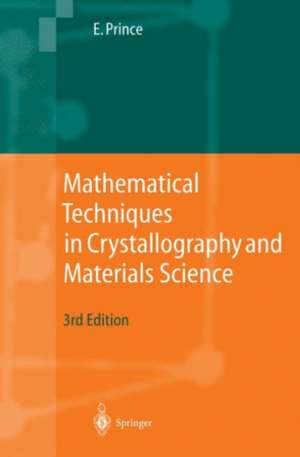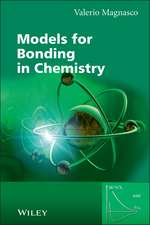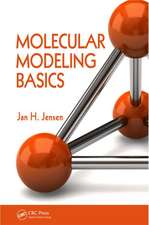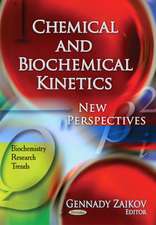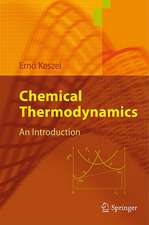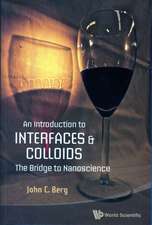Mathematical Techniques in Crystallography and Materials Science
Autor Edward Princeen Limba Engleză Paperback – 23 mar 2004
Preț: 779.57 lei
Preț vechi: 950.70 lei
-18% Nou
Puncte Express: 1169
Preț estimativ în valută:
149.22€ • 162.14$ • 125.42£
149.22€ • 162.14$ • 125.42£
Carte tipărită la comandă
Livrare economică 21 aprilie-05 mai
Preluare comenzi: 021 569.72.76
Specificații
ISBN-13: 9783540211112
ISBN-10: 354021111X
Pagini: 240
Ilustrații: XII, 224 p.
Dimensiuni: 155 x 235 x 13 mm
Greutate: 0.37 kg
Ediția:3rd ed. 2004
Editura: Springer Berlin, Heidelberg
Colecția Springer
Locul publicării:Berlin, Heidelberg, Germany
ISBN-10: 354021111X
Pagini: 240
Ilustrații: XII, 224 p.
Dimensiuni: 155 x 235 x 13 mm
Greutate: 0.37 kg
Ediția:3rd ed. 2004
Editura: Springer Berlin, Heidelberg
Colecția Springer
Locul publicării:Berlin, Heidelberg, Germany
Public țintă
ResearchCuprins
1 Matrices: Definitions and Fundamental Operations.- Fundamental Matrix Operations.- Linear Algebra.- Eigenvalues.- Linear Transformations.- Rotation of Axes.- The Metric Tensor.- 2 Symmetry of Finite Objects.- Groups.- Representations.- Point Groups.- Basis Functions.- 3 Symmetry of Infinitely Repeated Patterns.- Bravais Lattices.- Space Groups.- 4 Vectors.- Scalar and Vector Products.- The Reciprocal Lattice.- The Orientation Matrix.- Zones and Forms.- Sublattices and Superlattices.- 5 Tensors.- Covariance and Contravariance.- The Multivariate Normal Disribution.- Anisotropic Atomic Displacement Factors.- The Equivalent Isotropic Temperature Factor.- Effect of Symmetry.- Tensors of Higher Ranks.- Moments and Cumulants.- Rigid Body Motion.- 6 Data Fitting.- Fitting Functions.- Finding the Minimum.- False Minima.- 7 Estimation of Uncertainty.- Estimates.- The Precision of Estimates of Precision.- Models with More than One Parameter.- Estimates of Precision When the Model Is Not Least Squares.- 8 Significance and Accuracy.- The F Distribution.- Student’s t Distribution.- Correlation.- Relationship Between Precision and Accuracy.- Uncertainties of Derived Functions.- The Projection Matrix.- 9 Constrained Crystal Structure Refinement.- The Observed Data.- The Model.- The General Form for a Constrained Model.- Shape Constraints.- Rigid Body Thermal Motion Constraints.- Chemical Constraints.- Representing non-Gaussian Distributions.- 10 The Fast Fourier Transform.- The Discrete Fourier Transform.- The Good-Thomas Algorithm.- The Cooley-Tukey Algorithm.- Prime Numbers.- FFTs for Real Sequences.- Space Group Symmetry.- Appendix A Stereographic Projection.- Appendix B Eigenvalues and Eigenvectors of 3 × 3 Symmetric Matrices.- Appendix C Sublattices and Superlattices.-Appendix D The Probability Integral, the Gamma Function, and Related Topics.- Appendix E The Harmonic Oscillator in Quantum Mechanics: Bloch’s Theorem.- Appendix F Symmetry Restrictions on Second, Third, and Fourth Rank Tensors.- Appendix G Some Useful Computer Programs.- ndex.
Recenzii
From the reviews of the third edition:
"Mathematical Techniques in Crystallography and Material Science brings together common and less familiar mathematical procedures used in studies of the structures and physical properties of solids. This practical guide and reference serves as a unified source book for students and professionals, and it provides a solid basis for further studies in more specialized literature. Based Prince’s decades of practical experience, it can be recommended as an introduction for beginners in crystallography, as a refresher and handy guide for crystallographers working on specific problems … ." (Chimie Nouvelle Societe, Vol. 23 (89), 2005)
"This book presents a series of mathematical methods and procedures … . The material is well set out … . In a refreshing approach, the references are introduced with a historical flavour. ... This type of book would be particularly useful for students and professionals who are new to crystallography. It would also be a handy guide to materials scientists … . this book generally fulfils its aims as a practical guide and reference to students and professionals in the field of crystallography." (Dougal McCulloch, Chemistry in Australia, November, 2004)
"Mathematical Techniques in Crystallography and Material Science brings together common and less familiar mathematical procedures used in studies of the structures and physical properties of solids. This practical guide and reference serves as a unified source book for students and professionals, and it provides a solid basis for further studies in more specialized literature. Based Prince’s decades of practical experience, it can be recommended as an introduction for beginners in crystallography, as a refresher and handy guide for crystallographers working on specific problems … ." (Chimie Nouvelle Societe, Vol. 23 (89), 2005)
"This book presents a series of mathematical methods and procedures … . The material is well set out … . In a refreshing approach, the references are introduced with a historical flavour. ... This type of book would be particularly useful for students and professionals who are new to crystallography. It would also be a handy guide to materials scientists … . this book generally fulfils its aims as a practical guide and reference to students and professionals in the field of crystallography." (Dougal McCulloch, Chemistry in Australia, November, 2004)
Textul de pe ultima copertă
Crystallographers have to apply many mathematical methods in their daily work. "Mathematical Techniques in Crystallography and Materials Science" brings together common and less familiar mathematical procedures used in studies of the structures and physical properties of solids. This practical guide and reference serves as a unified source book for students and professionals, and it provides a solid basis for further studies in more specialized literature. Based Prince’s decades of practical experience, it can be recommended as an introduction for beginners in crystallography, as a refresher and handy guide for crystallographers working on specific problems, and as a reference for others seeking a dictionary of basic mathematical and crystallographic terms. The third edition further clarifies key points.
Caracteristici
E. Prince wrote the book for active research workers in crystallography and materials science They will find just that information and data they need for their daily work The third edition is revised and updated Includes supplementary material: sn.pub/extras
